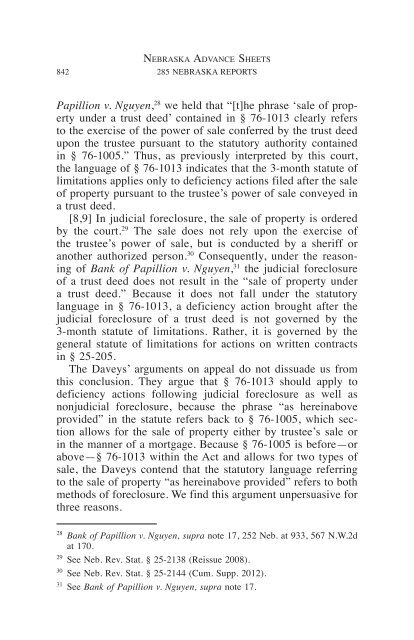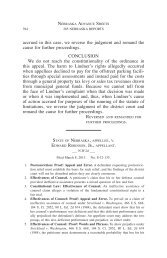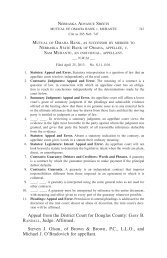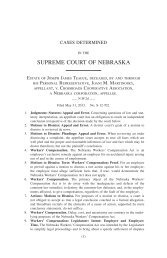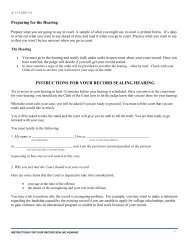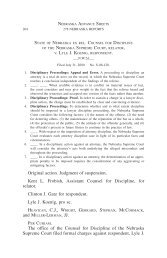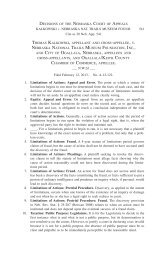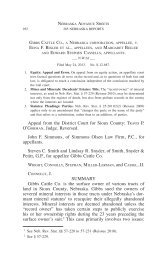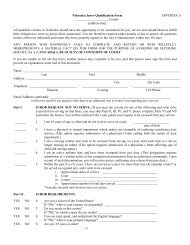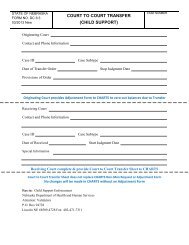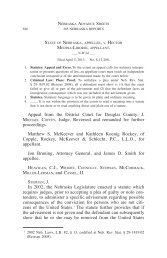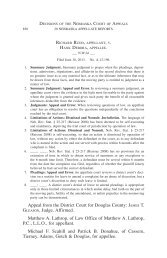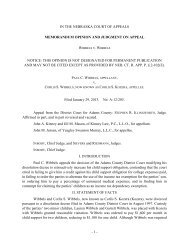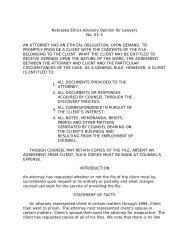First Nat. Bank of Omaha v. Davey - Nebraska Judicial Branch
First Nat. Bank of Omaha v. Davey - Nebraska Judicial Branch
First Nat. Bank of Omaha v. Davey - Nebraska Judicial Branch
Create successful ePaper yourself
Turn your PDF publications into a flip-book with our unique Google optimized e-Paper software.
<strong>Nebraska</strong> Advance Sheets<br />
842 285 NEBRASKA REPORTS<br />
Papillion v. Nguyen, 28 we held that “[t]he phrase ‘sale <strong>of</strong> property<br />
under a trust deed’ contained in § 76-1013 clearly refers<br />
to the exercise <strong>of</strong> the power <strong>of</strong> sale conferred by the trust deed<br />
upon the trustee pursuant to the statutory authority contained<br />
in § 76-1005.” Thus, as previously interpreted by this court,<br />
the language <strong>of</strong> § 76-1013 indicates that the 3-month statute <strong>of</strong><br />
limitations applies only to deficiency actions filed after the sale<br />
<strong>of</strong> property pursuant to the trustee’s power <strong>of</strong> sale conveyed in<br />
a trust deed.<br />
[8,9] In judicial foreclosure, the sale <strong>of</strong> property is ordered<br />
by the court. 29 The sale does not rely upon the exercise <strong>of</strong><br />
the trustee’s power <strong>of</strong> sale, but is conducted by a sheriff or<br />
another authorized person. 30 Consequently, under the reasoning<br />
<strong>of</strong> <strong>Bank</strong> <strong>of</strong> Papillion v. Nguyen, 31 the judicial foreclosure<br />
<strong>of</strong> a trust deed does not result in the “sale <strong>of</strong> property under<br />
a trust deed.” Because it does not fall under the statutory<br />
language in § 76-1013, a deficiency action brought after the<br />
judicial foreclosure <strong>of</strong> a trust deed is not governed by the<br />
3-month statute <strong>of</strong> limitations. Rather, it is governed by the<br />
general statute <strong>of</strong> limitations for actions on written contracts<br />
in § 25-205.<br />
The <strong>Davey</strong>s’ arguments on appeal do not dissuade us from<br />
this conclusion. They argue that § 76-1013 should apply to<br />
deficiency actions following judicial foreclosure as well as<br />
nonjudicial foreclosure, because the phrase “as hereinabove<br />
provided” in the statute refers back to § 76-1005, which section<br />
allows for the sale <strong>of</strong> property either by trustee’s sale or<br />
in the manner <strong>of</strong> a mortgage. Because § 76-1005 is before—or<br />
above—§ 76-1013 within the Act and allows for two types <strong>of</strong><br />
sale, the <strong>Davey</strong>s contend that the statutory language referring<br />
to the sale <strong>of</strong> property “as hereinabove provided” refers to both<br />
methods <strong>of</strong> foreclosure. We find this argument unpersuasive for<br />
three reasons.<br />
28<br />
<strong>Bank</strong> <strong>of</strong> Papillion v. Nguyen, supra note 17, 252 Neb. at 933, 567 N.W.2d<br />
at 170.<br />
29<br />
See Neb. Rev. Stat. § 25-2138 (Reissue 2008).<br />
30<br />
See Neb. Rev. Stat. § 25-2144 (Cum. Supp. 2012).<br />
31<br />
See <strong>Bank</strong> <strong>of</strong> Papillion v. Nguyen, supra note 17.


